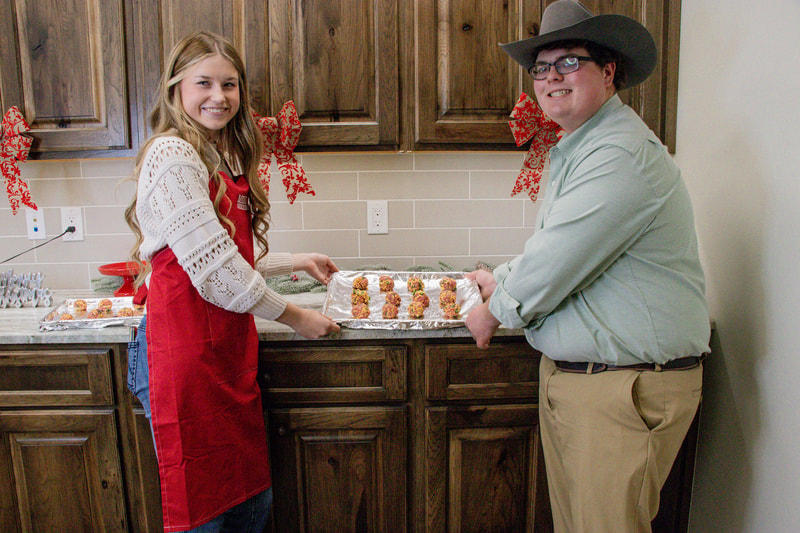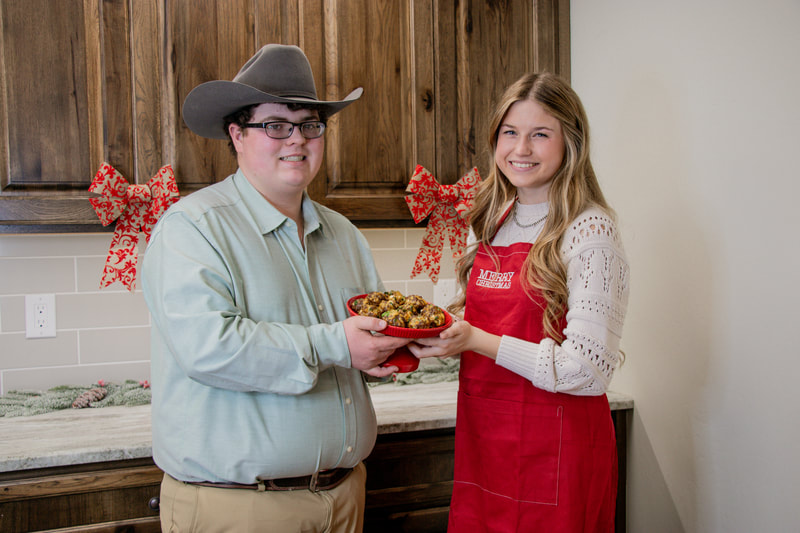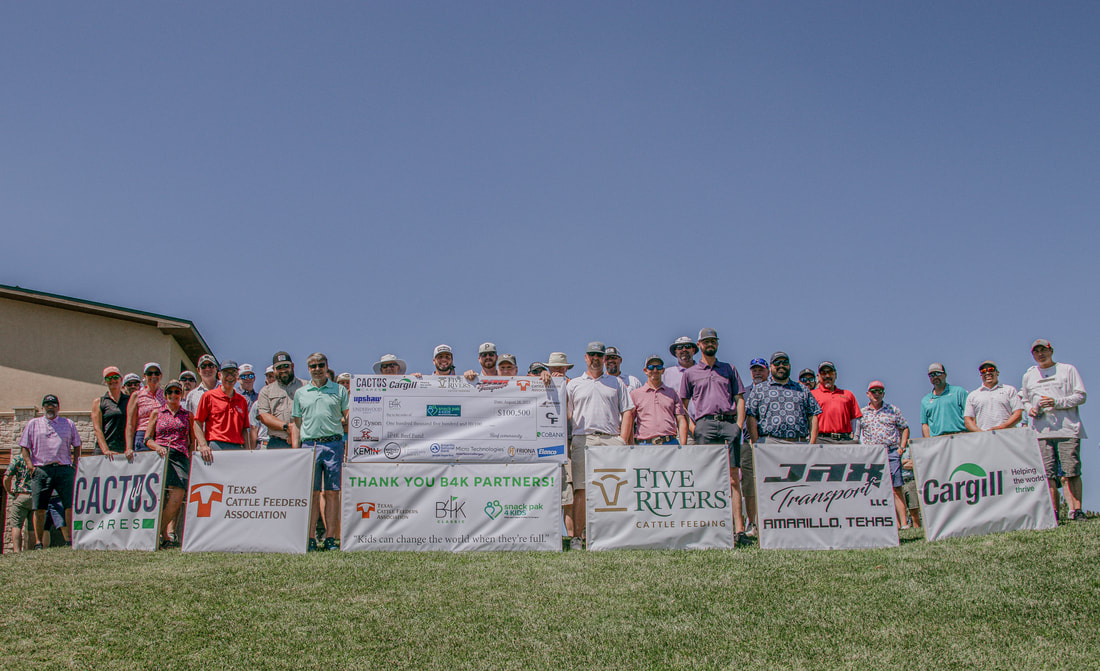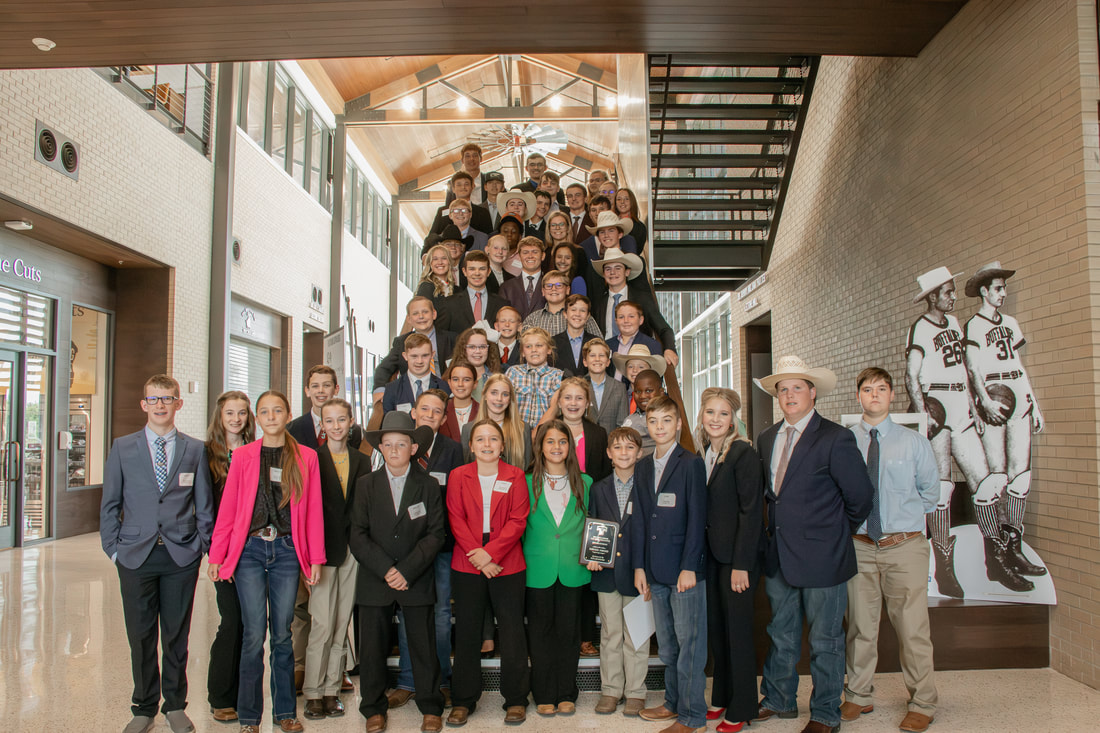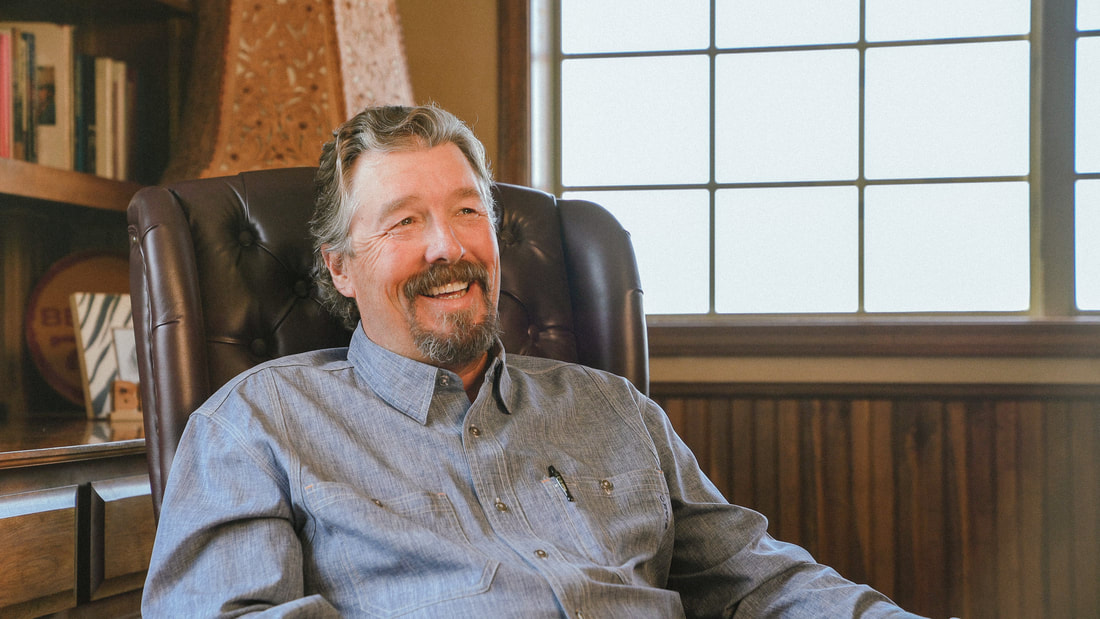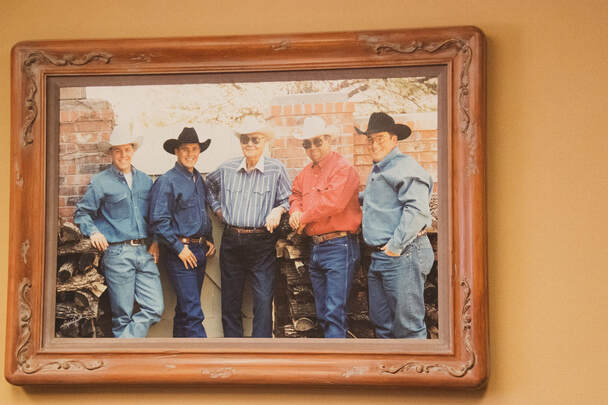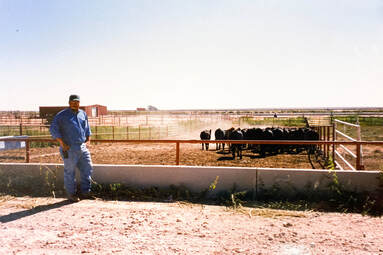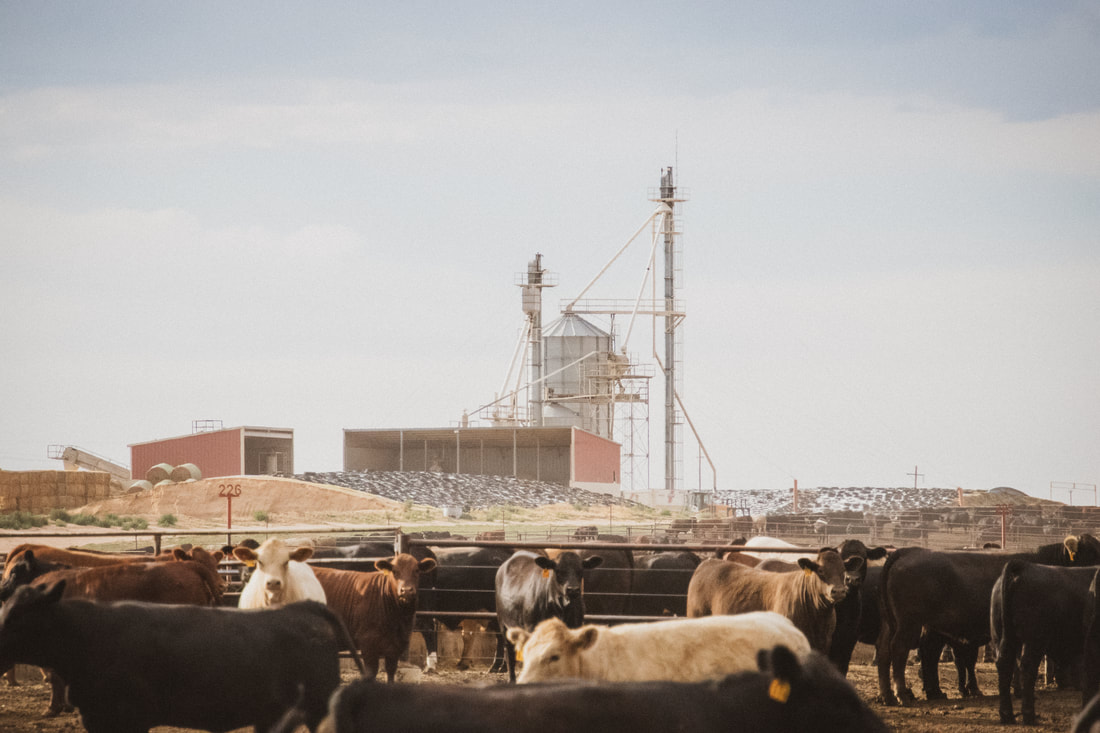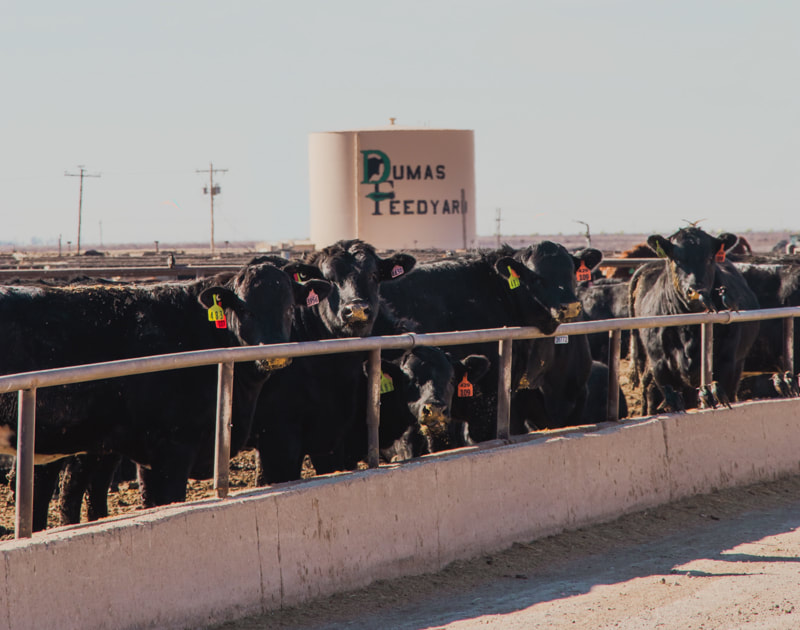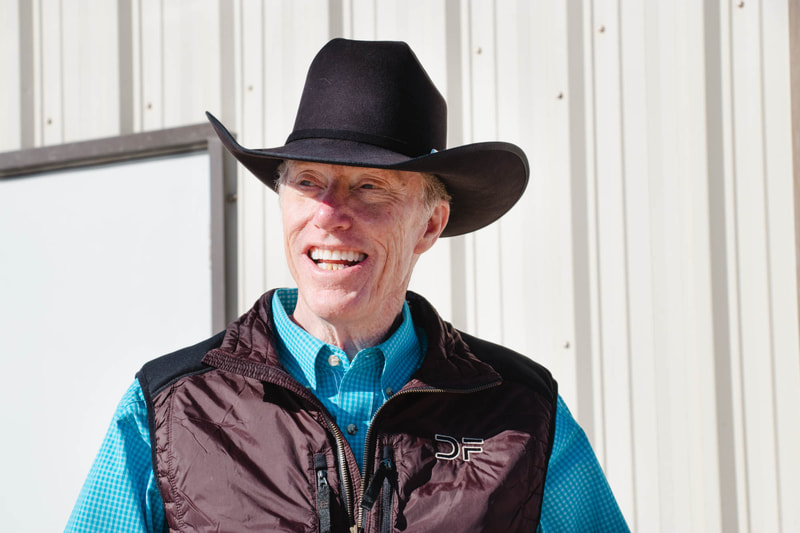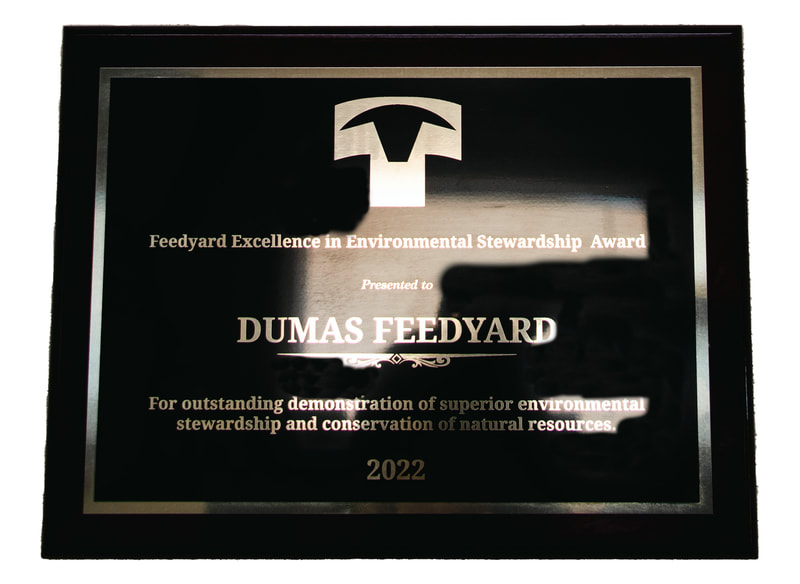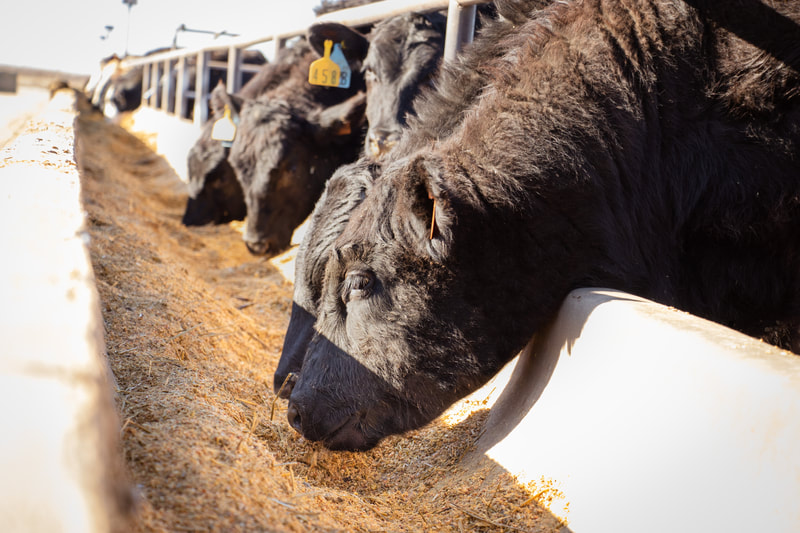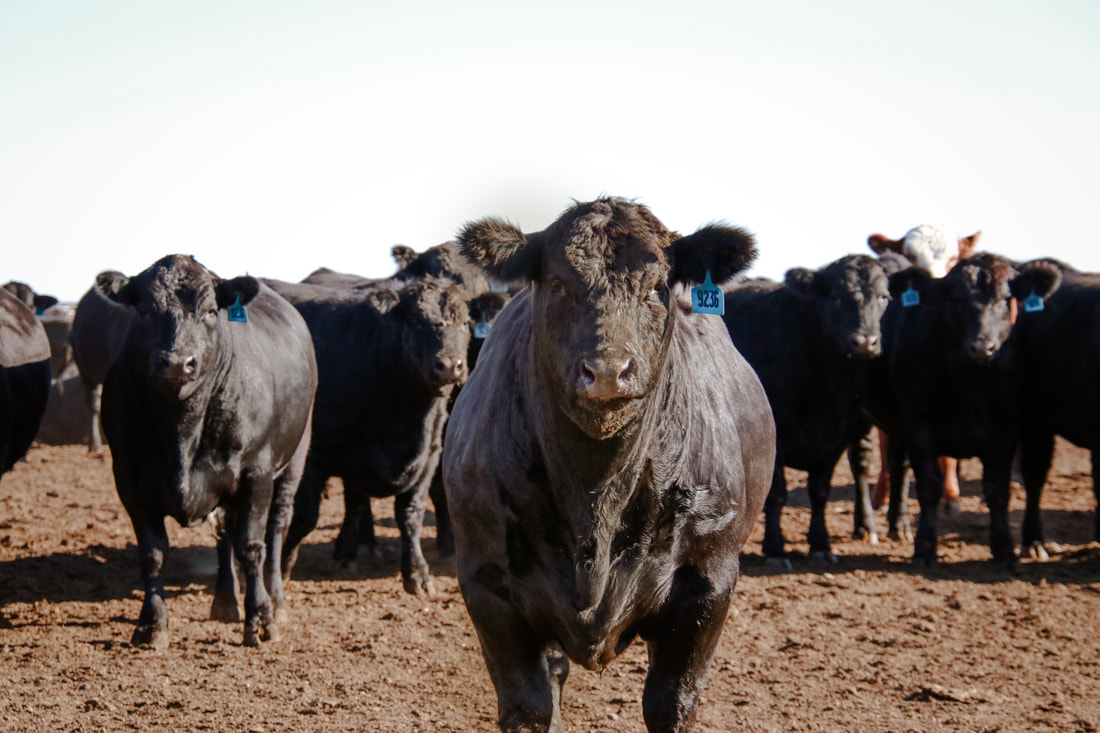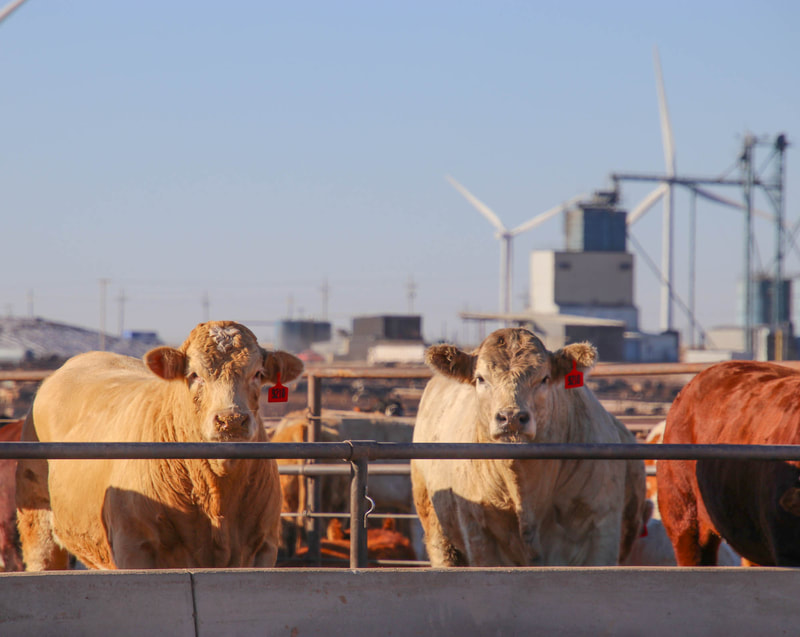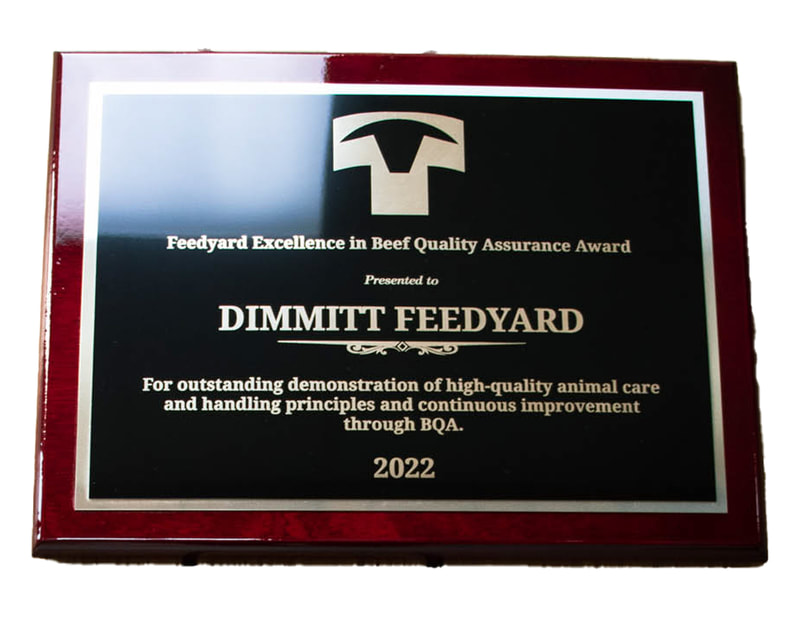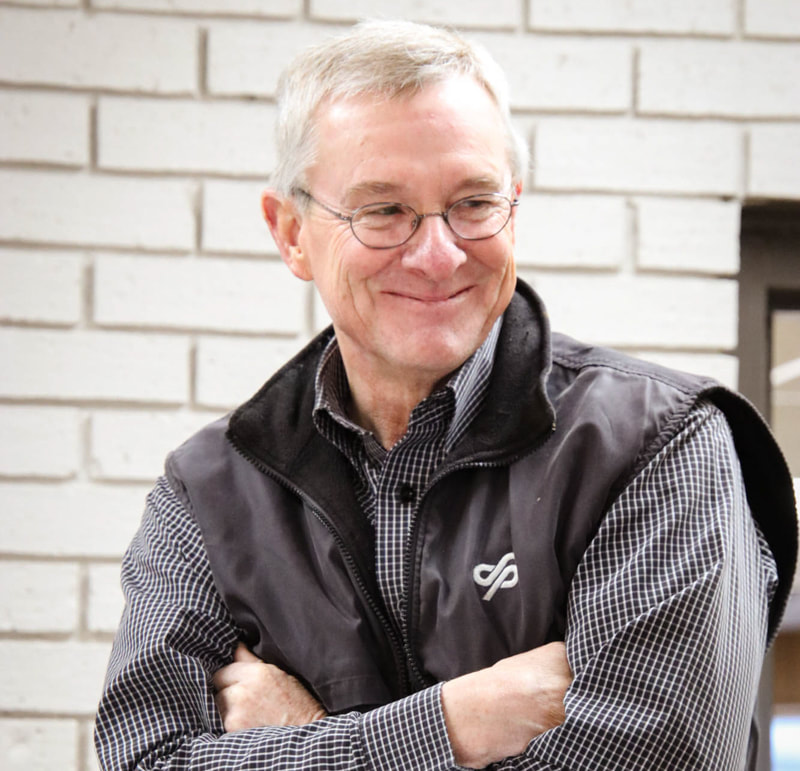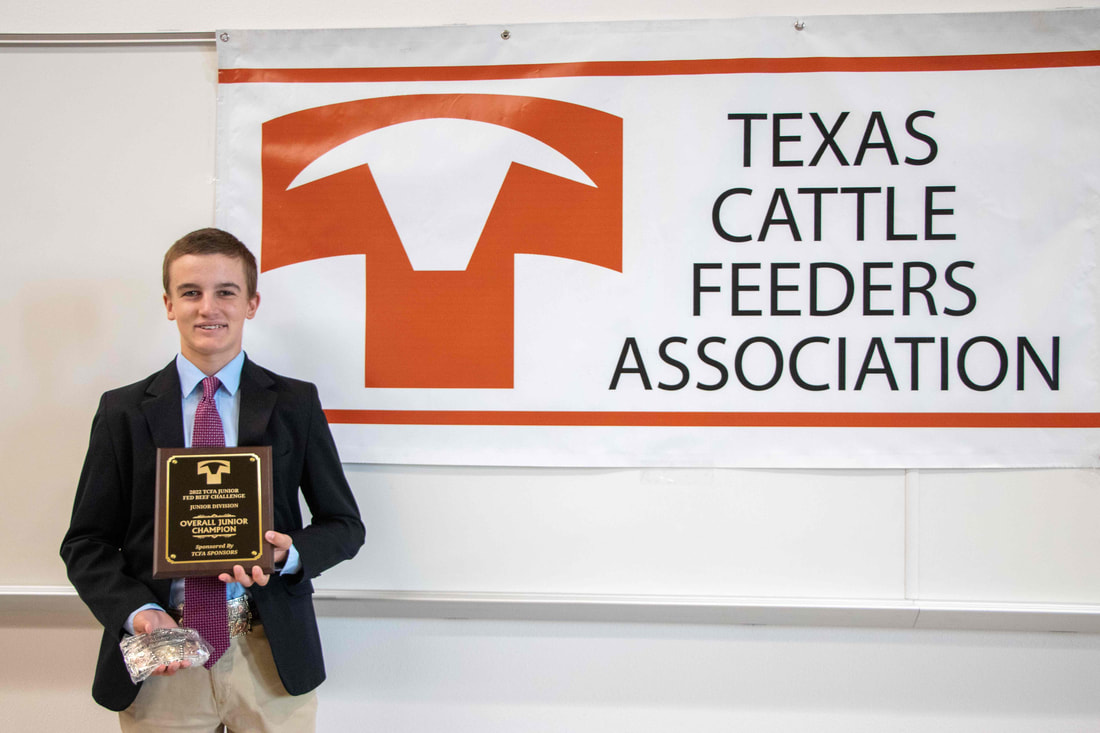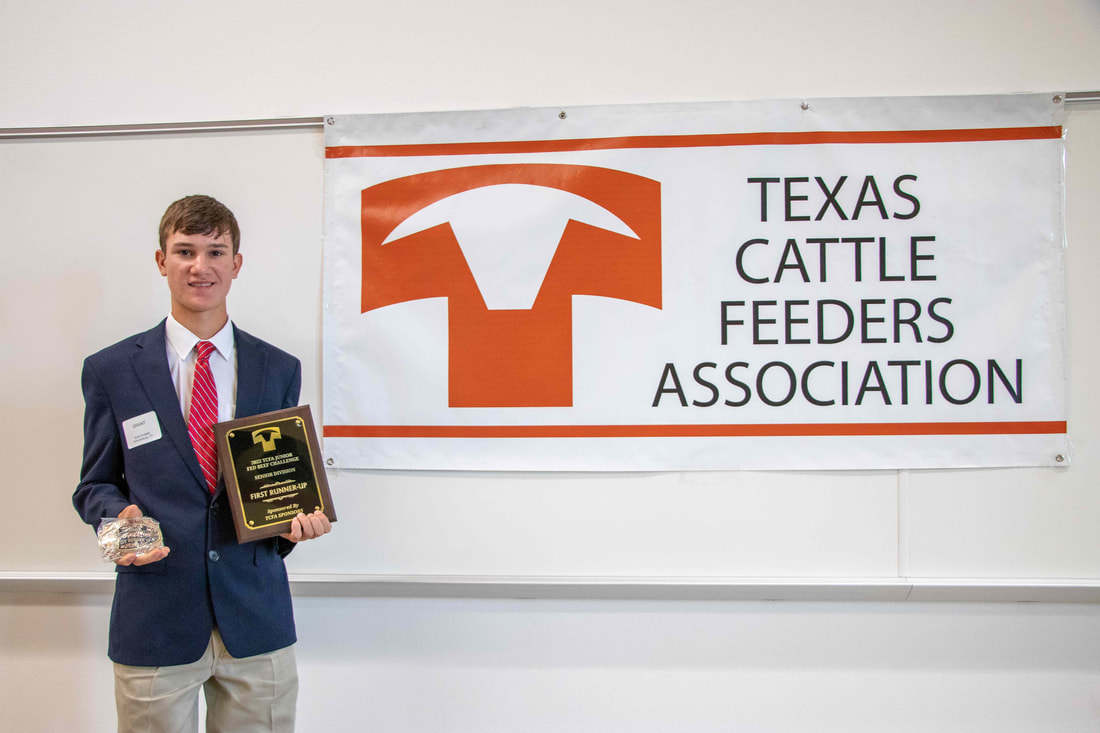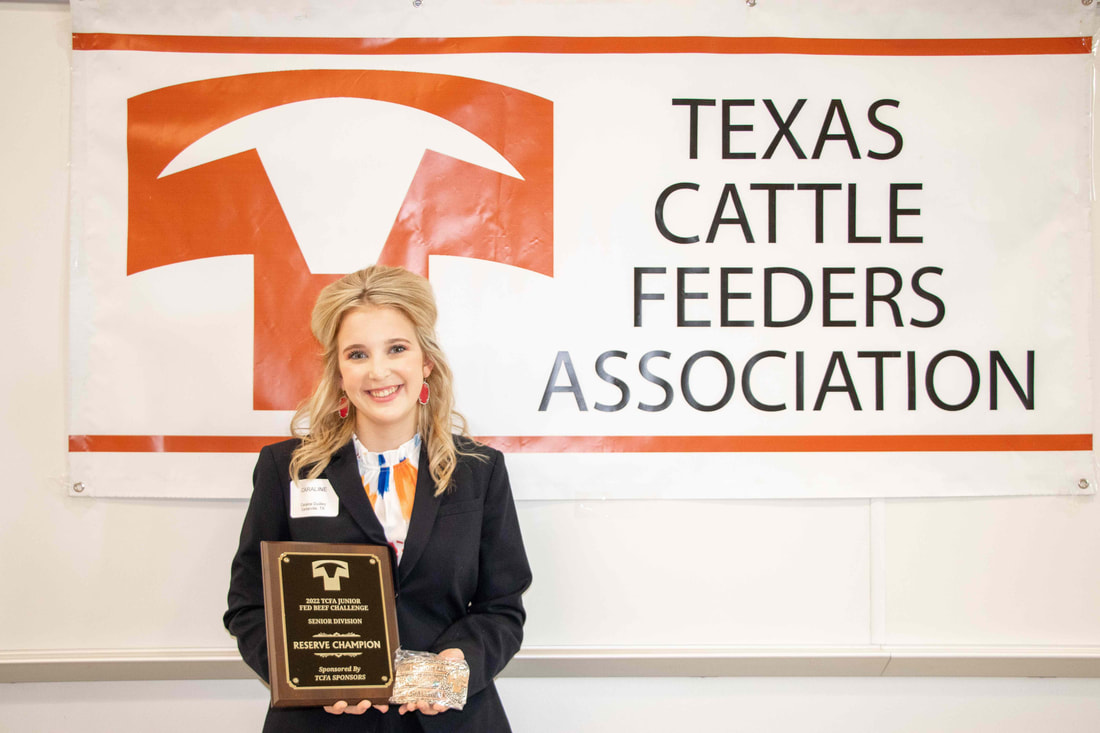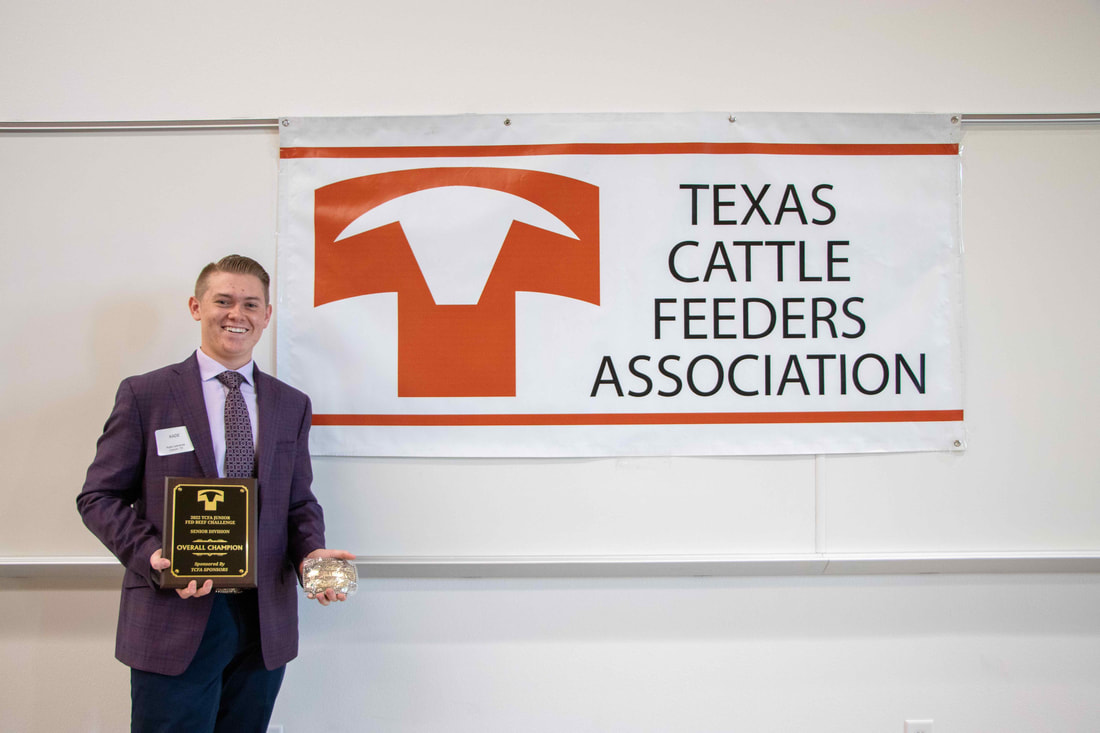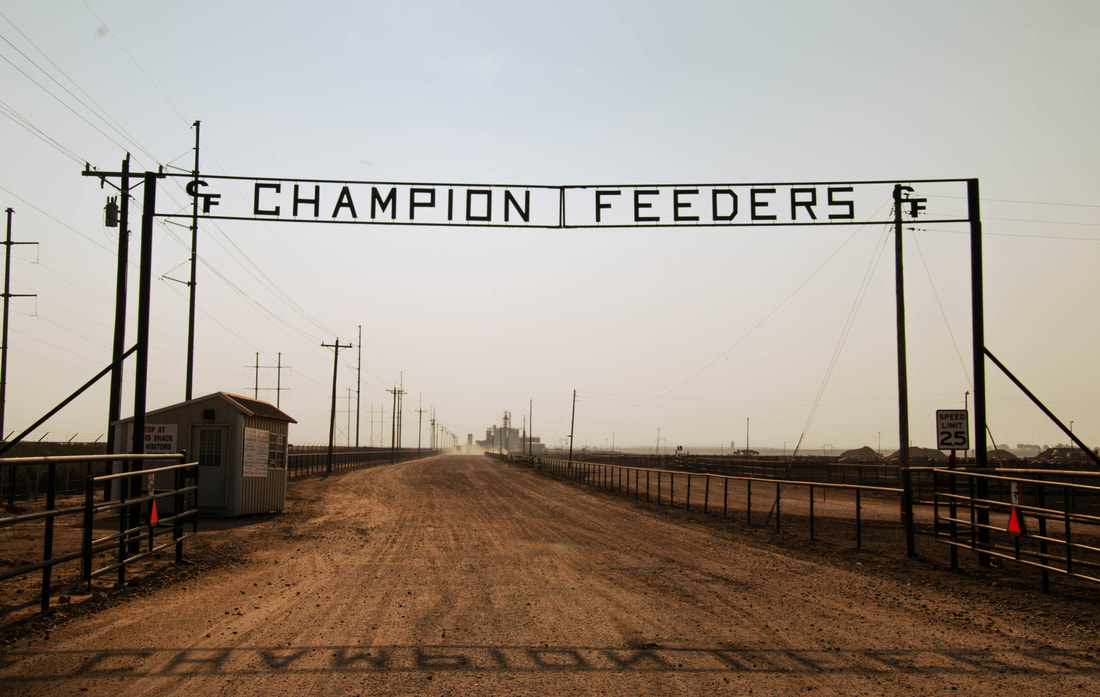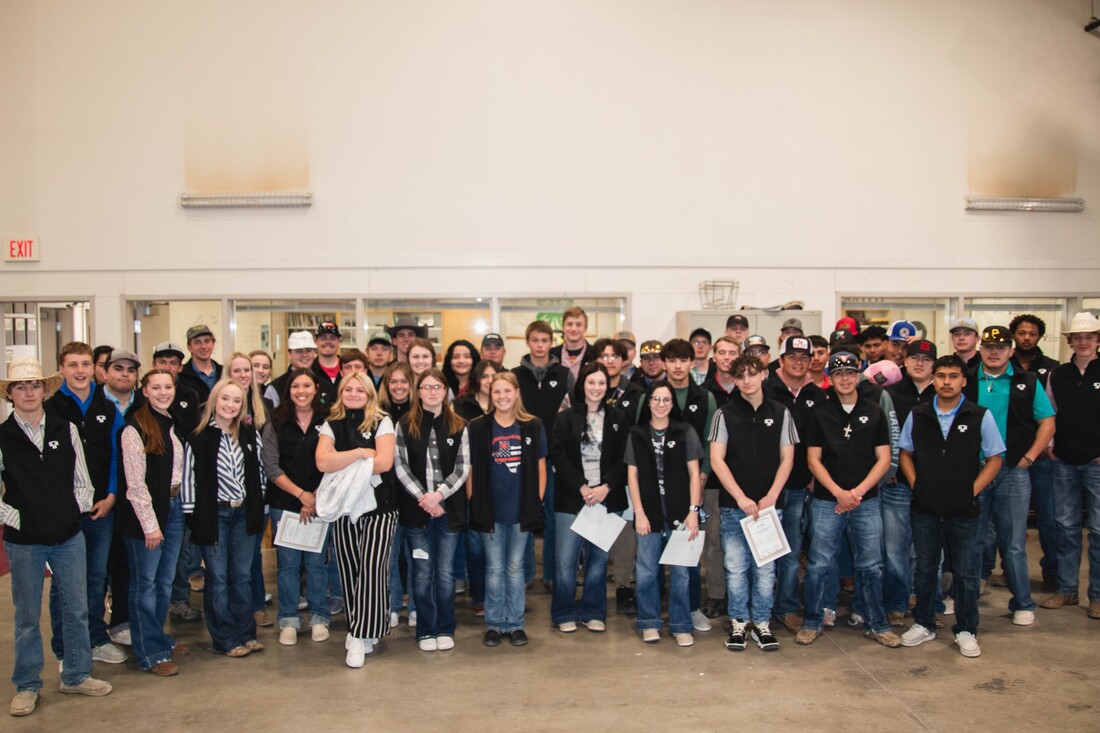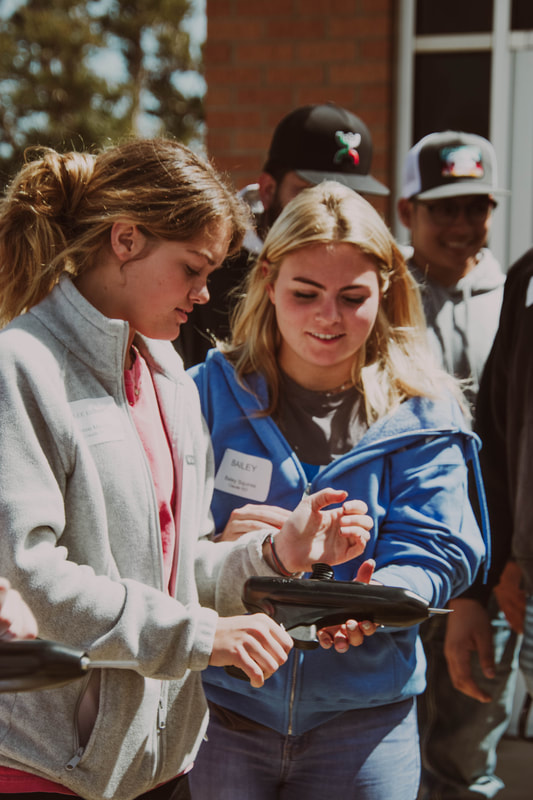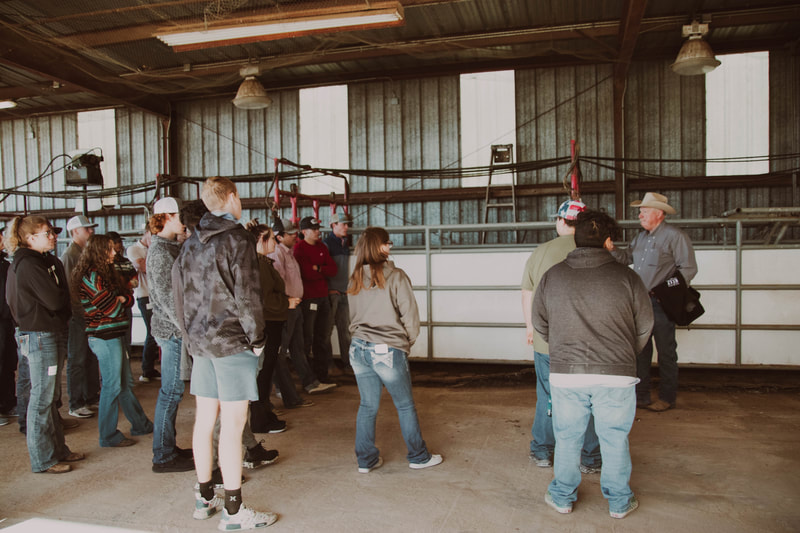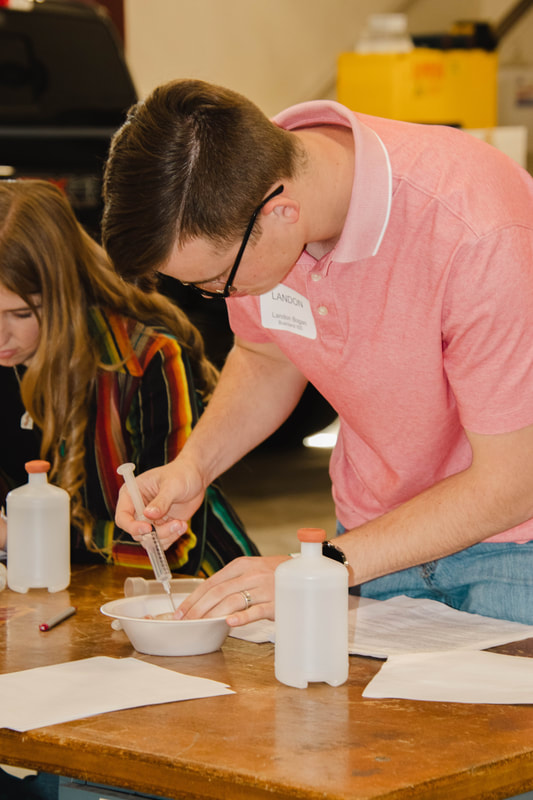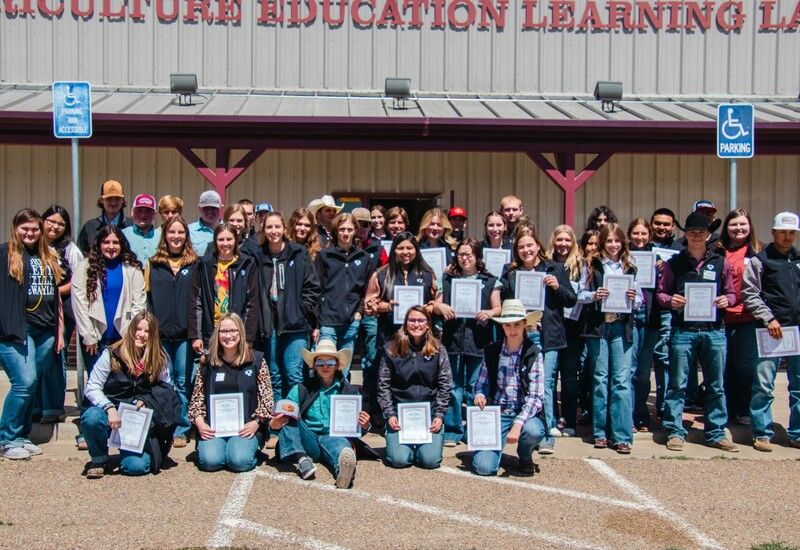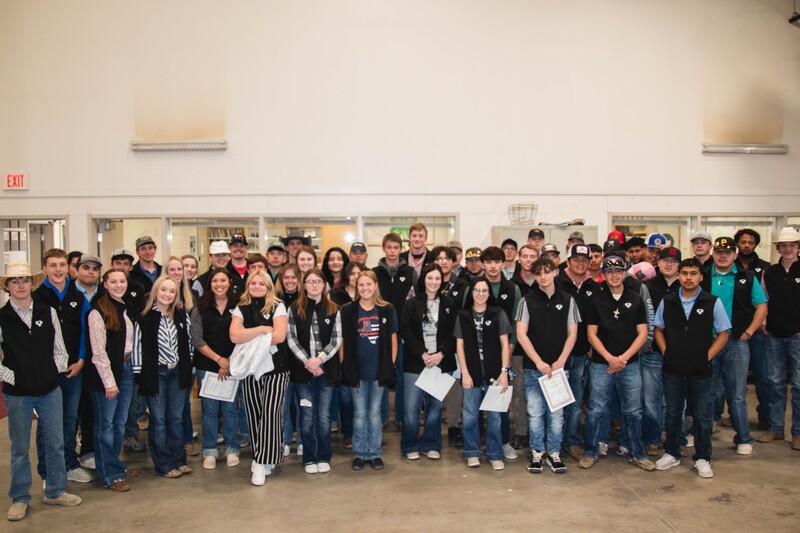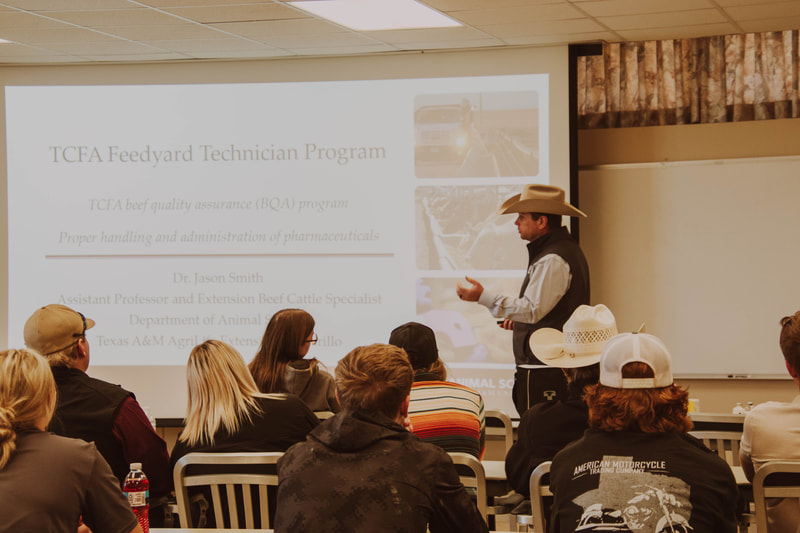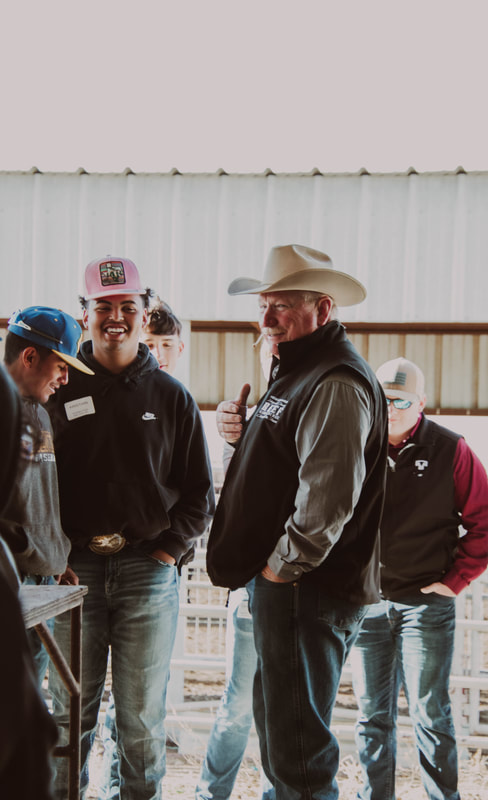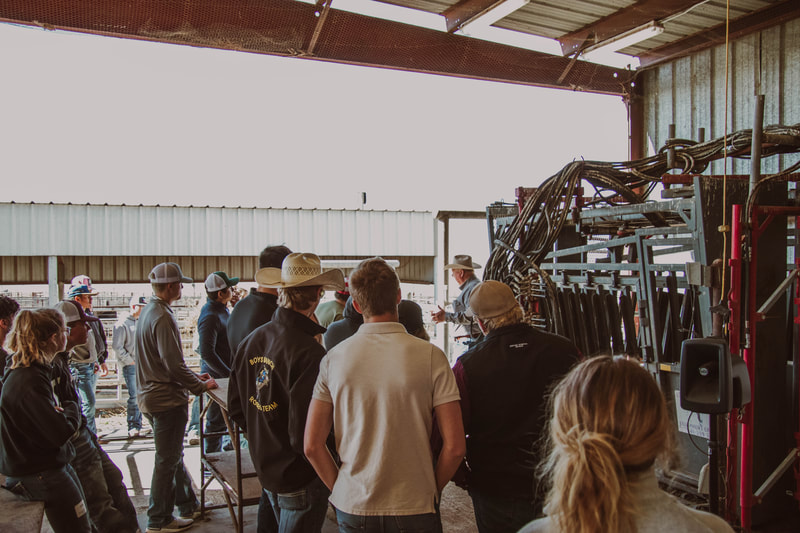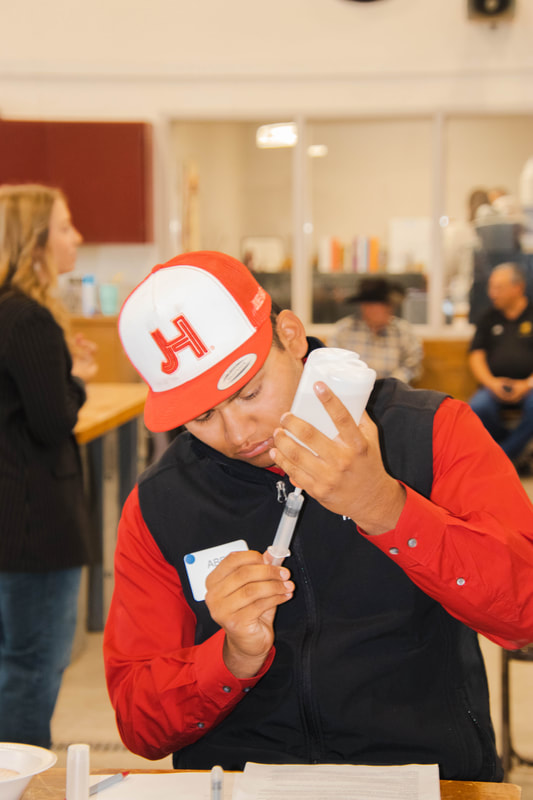|
By Lindsey Sawin Feedyard employees serve as the backbone of beef production. However, it is no secret that finding employees for jobs in the fed beef industry can be difficult. A job at the feedyard requires hard work, dedication to a craft, unconventional working hours and a willingness to care for cattle and feedyard facilities no matter the weather conditions. “Employee retention has always been an issue in the feedyards,” Brady Miller, TCFA Director of Market, Membership and Education, said. “So, we sent a survey to members asking about the need for employees and the survey said yes, we need help, yes, we will support a program that will help drive employees to the feedyard.” Fifteen years ago, TCFA set out to find the best way to introduce young adults to a career in the feedyard. For several years TCFA staff completed research and sought information and partnerships to put together a program that would help meet staffing needs. “It took a lot of time to hone in on what is now called the Feedyard Technician Program and build a specialized curriculum for high school students,” Miller said. In 2013 the association settled on a program that would expose high school juniors and seniors to cattle care and handling and machinery operations at a feedyard, splitting the program into two sessions so that students could gain more hands-on opportunities in each portion. Since the beginning, it has been TCFA’s goal to show students a path for them at the feedyard, whether it be working directly with cattle, in the office, in the mill or in maintenance. “It is important to get opportunities in front of students. If they don’t ever see it, they don’t ever know it exists,” Miller said. He knew that if the program was going to be a success, they needed someone who was familiar with agricultural education teachers to help them in their outreach to schools. Robert Devin was the person who could do exactly that. When the program was in its early years, the retired extension agent went to each school individually and taught students the material needed to successfully complete the program. The program started with just 20 students from five schools in the Panhandle. It has grown immensely in the last 10 years. In 2023 over 450 students were exposed to opportunities they may not know exist at a feedyard and over 3,000 students have gone through the program since its inception. This growth has opened doors to opportunities for TCFA feedyard members, the schools that participate and the students. Texas started putting more emphasis on students graduating high school with certificates after House Bill 5 was passed in 2013 and was implemented for students entering high school during the 2014-15 school year, Miller said. Agriculture teachers and TCFA began looking into how they could help participating schools reach that goal. In 2019 the Texas Education Agency (TEA) recognized the program allowing participating students and schools to receive credit when a student successfully completes the program. “The TEA recognition took our program to a whole new level and soon after the program expanded beyond the Panhandle,” Miller said. The cattle care and handling part of the program is now hosted at three locations across Texas each spring. Miller said they plan to do the same with the machinery operation session. How It Works
The Feedyard Technician Program is split into spring and fall sessions, allowing students a more in-depth view of what opportunities are available to them. “The idea behind having separate categories at different times of the year is that not all students will want to handle cattle and not all students will want to be welders or be involved with maintenance although many students do participate in both sessions,” Miller said. Since its beginnings, the program and people involved with it have had a goal of engaging students with an industry they may or may not be familiar with. “The mission of the program is to create, generate and build the future work force,” Miller said. Students do not just listen and watch speakers; they participate and have the chance to practice newly learned skills themselves. “I distinctly remember the lab exercise of giving intramuscular and subcutaneous shots,” Cutter Smith, 2015 Feedyard Technician Program participant and manager at Tascosa Feedyard, said. “That’s where I learned how to give shots and is still something I use today.” Once students have spent time learning the materials, visiting feedyards, driving machinery and practicing new skills, they participate in test day. Test day requires them to showcase their knowledge during a written exam, perform the newly learned skills and participate in an interview with an industry professional. In order to earn their certificate, they must receive a 70 percent score or higher in each category. TCFA felt the interview portion was important to the success of students outside of high school. “It does not matter how good you are at whatever skill you have if you cannot get through an interview,” Miller said. Creating Success Stories As the program has progressed over the years, success stories have evolved and students who were once participants in the program have become program speakers, successful feedyard employees and advocates for the industry. “The program has been offered for 10 years, and we are starting to see these students grow in their roles and responsibilities at feedyards,” Miller said. “If a student gets hired as a doctor, we may not work directly with that student to start with, but now we are seeing these students rise to supervisor and manager positions.” For Smith, the program solidified his path for the future and helped him climb the ladder. “Going through the tech program my senior year solidified that I was interested in the feedyard industry,” Smith said. “I have always said I am interested in making cattle make money and I really like fat cattle. This portion of the industry is what interests me the most.” In 2015, Antonio Adame, mill manager at Dimmitt Feedyard, was introduced to the feeding industry through the Feedyard Tech Program which gave him the confidence to apply for feedyard jobs. “I was interested in welding and using machinery so I thought going through the program would expose me to future opportunities,” Adame said. “Going through the program gave me the confidence to apply for a job at the West Texas A&M University Feedlot while working on my degree.” Adame now helps with the program each fall, leading students through the mill and answering questions about his job at the feedyard. “After going through the program and now speaking to participants, I understand the students who do not have a lot of questions,” Adame said. “Now as a manager, I try to answer the questions I had when I was in their shoes.” In addition to exposing students to future careers at the feedyard, the program develops advocates for the cattle feeding industry. “Even if you do not have a plan or desire to be in the industry, the most important thing that anyone should know is that we get up and eat, sleep and breathe taking care of animals,” Smith said. “Our livelihoods, our jobs and our purpose in life at the feedyard is to make sure that the animals have the best lives before it goes back to feed us.” While the Feedyard Technician Program has not fixed every labor issue faced by TCFA member feedyards, it has introduced students to new career paths and brought many talented employees to the table. “The students see the TCFA program up front and can see how it benefits the industry in training employees and in lobbying for our industry,” Smith said. “How many kids would know what the feedyard industry does without the efforts of TCFA?”
0 Comments
By Lindsey Sawin When Gene Lowrey became a part of the cattle feeding industry 30 years ago, he hit the ground running, with a desire to learn, a passion to give back and to advocate for the rest of the industry, which is likely the reason he is serving as the Texas Cattle Feeders Association Chairman. “I was going to will my way through no matter what,” Lowrey said. “I was going to work hard, be honest, listen to people who knew more than I did and I was going to learn everything I could.” Lowrey grew up on a commercial cow-calf operation in Southwest Alabama. Growing up on the ranch taught him the value of hard work, the importance of dedication and created a love for the cattle industry. He packed his bags in 1991 and moved to Stillwater, Oklahoma to pursue an animal science and business degree at Oklahoma State University (OSU). He left with a burning passion to be involved in the cattle business. “Leaving home wasn’t the easiest thing, but on the other side of that I found a great opportunity where I am, and I have been involved with things that I had no idea I would ever be involved,” he said. While in college, he worked at the OSU Wheat Pasture Research Station. It was there that he was introduced to cattle feeding. Some of the cattle on trial were sent to Cimarron Feeders to be finished. Lowrey met John Rakestraw at the feedyard and later Rakestraw offered him his first job after college. He started as a feedlot trainee and has not looked back since. “I had no idea that I would stay this long, but I have no regrets, nor would I do anything different. I have learned so much and met so many great people,” he said. “If I would have picked up and moved back home and lived in my own little world, never ever would I have been exposed to the things I have been exposed.” A desire to learn
Growing up in an area of the country that is not conducive to feeding cattle meant that Lowrey had not been around the size or scale of operation that was Cimarron Feeders. “The learning curve was pretty steep, I knew nothing about nothing,” he said with a laugh. “I had never been exposed to anything of that scale. The most cattle I had ever seen was at a sale barn coming from the southeast.” While the knowledge gap was big, Lowrey was passionate about gaining the knowledge it took to manage a feedyard and to manage people. Lowrey spent four years at Cimarron Feeders where he said he learned everything he could before moving to Hartley Feeders in 1998. He started there as the feed manager and again took every opportunity to learn. Eventually, he was promoted to general manager at Hartley Feeders and in 2009 he moved to XIT Feeders in Dalhart where he currently works. He loves being able to share his knowledge with young employees and help them grow. “A big part our company’s philosophy is developing people from within,” Lowrey said. “It is tremendously exciting for me to see young people move up through the organization and take on more responsibility and produce great results. That is the thing that keeps me going at the feedyard.” Paying it forward Giving back to the industry that has provided him with unique opportunities is something Lowrey set out to do since the beginning. “I always felt that if I was going to make my living in this industry, I needed to give back,” Lowrey said. TCFA has provided him the opportunity to give back and play a role in moving the industry forward. Lowrey is the kind of leader that is quick to listen, while bringing knowledge and perspective to the table, TCFA President and CEO Ben Weinheimer said. “Gene Lowrey has been an engaged and productive member of TCFA for many years,” Weinheimer said. “He is passionate about feeding cattle and upholding the values of the industry and association while moving them both forward. We are thankful for his leadership and willingness to represent TCFA membership this year.” Part of Lowrey’s efforts to give back include leaving the feedyard to make trips to Austin and Washington D.C. “While I may not be at the feedyard, I am still trying to help the people who are at the feedyard by making sure that the things that don’t need to happen don’t happen and that the things that need to happen do happen,” Lowrey explained. “I think it is a privilege to be a part of all of that.” In his many years of involvement within the feedyard industry, he has seen it evolve and grow. As chairman, he wants to see the industry continue to make progress. “If we get complacent, the world is going to pass us by and it will replace us with something that doesn’t have the story and doesn’t have the benefits that our product has,” Lowrey said. He is ready to take on the challenges thrown the industry’s way this year. He wants members to pull up a seat at the table and continue to move forward together. “Everybody has a chance to say what they need to say and be a part of making the decisions and getting the decisions down to the people who need to hear them,” Lowrey said. He wants to leave the industry better than where it was when he started. “It is a privilege to do this, and I do not take it lightly. I will do whatever the association and industry needs,” said Lowrey. “I care deeply for it, and it has afforded me a very good living. I have raised my family, and I am going to keep doing what I can to make it better.” A passion for the cattle business was instilled in Lowrey years ago on a small family cattle operation, a passion that has not been lost in the shuffle of life but has grown and developed into the thing that drives him. “The industry has to remember that we are there for a bigger purpose,” said Lowrey. “It gets me up and going to work each day. Being a part of feeding people is something that feels good. It gives everyone a sense of higher purpose. We are able to do what we do, and people enjoy a good steak or hamburger. It is more than the long hours and cold days and hot days. We are doing something people like and want to eat.” Ground Beef Jalapeño Popper Meatballs Looking for an easy yet tasty beef recipe to take to your next holiday gathering? We have just the recipe for you. These ground beef jalapeño popper meatballs are quick, delicious and only require five ingredients! Check out the recipe below.
What you’ll need:
Preheat oven to 400 degrees. Add all ingredients EXCEPT the cream cheese to a large bowl and mix together with your hands. Then roll 15-20 balls of cream cheese. Next make a small patty of the meat mixture (make to your desired size) and place a ball of cream cheese in the center of it and roll the meat mixture around the cream cheese, creating a meatball. Do this until you’ve used all of the ground beef and bake 13-15 minutes or until the reach an internal temperature of 165 degrees. This recipe makes between 15 and 20 meatballs. The Amarillo area beef community presented a check for $100,500 to the Snack Pak 4 Kids (SP4K) Beef Fund. One hundred percent of the money raised will provide food-insecure students with high-quality beef protein through the Snack Pak 4 Kids weekend backpack program. The check was presented at the fifth annual Beef 4 Kids golf tournament.
"In the past five years, more than $500,000 has been raised through the B4K golf tournament, to ensure kids in 50 area communities have access to protein every weekend. It is a blessing that our agriculture partners have come together to make this possible," said Dyron Howell, Founder and Executive Director of Snack Pak 4 Kids. The SP4K Beef Fund launched in October 2017. The program was designed to provide more protein over the weekend for hungry students in the Texas Panhandle. This year’s tournament pushed the fund to over half a million dollars in donations to the Beef Fund in just five years. Each year, local teachers answer survey questions from SP4K to ensure the program is adequately serving students in the area. “The students who get the bags are better mentally, physically and spiritually for having food over the weekends. They are alert, thinking and participating all the time during class and lab,” said a local teacher. Protein is an important addition to every Snack Pak bag and beef provides ten essential nutrients and vitamins, including protein, zinc and iron – three key nutrients that are essential for proper growth and development of children. “Texas Cattle Feeders Association is thankful for the strong partnership with Snack Pak 4 Kids and the opportunity to work with the community to provide high-quality beef protein to students in the area,” said Lindsey Sawin, TCFA Communications Coordinator. “Cattle feeders are dedicated stewards of their communities, and we are honored to be able to give back at the Beef 4 Kids Golf Tournament.” TCFA would like to thank the sponsors and golfers who made this year’s event possible. Major sponsoring organizations include Amarillo National Bank, Baptist Community Services, Bezner Beef, Cactus Cares, Cargill, Caviness, Champion Feeders, CoBank, Elanco, Five Rivers, Friona Industries, Jax Transport, Kemin, Kirkland Feedyard, Microtechnologies/MWI, Tyson, Underwood Law Firm and Upshaw Insurance. Students from across the TCFA region made their way to West Texas A&M University in Canyon, Texas on Friday, July 28 for the 2023 Junior Fed Beef Challenge. Over 60 contestants, who are in third through twelfth grade, delivered phenomenal performances in categories such as the written exam, junior presentations, senior interviews, top carcass and others. The goal of the contest is to expose youth to the ins and outs of feeding cattle and build the next generation of cattle feeders. Youth who participate in the contest are tasked with feeding a pen of steers, taking a written exam and participating in interviews and oral presentations. The performance of their cattle is also factored into their overall score. The 2023 Junior Fed Beef Challenge prizes were sponsored by 2023 TCFA Sponsors. In the Junior Division, the Overall Champion received a $350 prize and a trophy buckle. The overall winner was Caden Joy. In the Senior Division, the First Runner-Up received a $2,000 scholarship and trophy buckle. First Runner-Up went to Kade Lawrence. The Reserve Champion received a $3,000 scholarship and trophy buckle. The Reserve Champion went to Grant Kubala. The Senior Division Overall Champion received a $5,000 scholarship and a trophy buckle. The overall winner was Caraline Dudley Junior Division Results
Best Written Exam 3rd Place Written Exam – Baiden Beavers 2nd Place Written Exam – Jenna Stevenson 1st Place Exam and winner of a $250 prize – Caden Joy Best Presentation 3rd Place Presentation – Malley Ecord 2nd Place Presentation – Abby Ressler Best Presentation and winner of a $250 prize – Grayson McMurphy Best Individual Carcass 3rd Place Individual Carcass – Kennedy Wilhelm 2nd Place Individual Carcass – Kennedy Wilhelm Top Individual Carcass and winner of a $250 prize – Kennedy Wilhelm Best Pen Steer Points 3rd Place Carcass Pen – Adalyn Carrales 2nd Place Carcass Pen – Crockett Guenther Top Carcass Pen and winner of a $250 prize – Kennedy Wilhelm Top Rookie Award 2nd Place Rookie – Gracie Ginn Top Rookie and winner of a $250 prize – Crockett Guenther Senior Division Results Best Written Exam 3rd Place Written Exam – Samantha Unruh 2nd Place Written Exam – Grant Kubala 1st Place Exam and winner of a $500 prize – Caraline Dudley Best Interview 3rd Place Interview – Grant Kubala 2nd Place Interview – Caraline Dudley Best Interview and winner of a $500 prize – Kade Lawrence Best Individual Carcass 3rd Place Individual Carcass – Pierce Wilhelm 2nd Place Individual Carcass – Pierce Wilhelm Top Individual Carcass and winner of a $500 prize – Pierce Wilhelm Best Pen Steer Points 3rd Place Carcass Pen – Grant Kubala and Kaden Zinnante 2nd Place Carcass Pen – Winston Stevenson Top Carcass Pen and winner of a $500 prize – Pierce Wilhelm Top Rookie Award 3rd Place Rookie – Jhett Davis 2nd Place Rookie – Kade Davis Top Rookie and winner of a $500 prize – Lucas Sottosanti
By Hattie Robb
From farming to feeding cattle, production agriculture has always been in the cards for Michael Bezner.
“I enjoy growing things and the lifestyle that encompasses agriculture. I think it’s just in my DNA,” he says with a laugh. Growing up on his family’s farm and stocker operation in Dalhart, Bezner worked alongside his grandfather A.J. “Doc”, his dad, Jody, and his two brothers, Mitchel and Stephen, before heading to college. Bezner attended Texas A&M University where he studied animal science and was a member of both the meat and livestock judging teams. After graduating, Bezner worked under Bob Price in the livestock analyst office at the former Cargill Investor Services in Chicago. But the windy city blew him back to the family business in 1991, and Bezner has been preserving that same lifestyle ever since. Proving there’s no place like home, he and his wife, Camille, currently reside in Dalhart and have three daughters, along with one granddaughter. “I always knew I’d end up back here. Sure, we have good days and bad days, but there’s nowhere else I’d rather be.” From the Ground Up With farming in his blood and a desire to keep producing, Bezner decided to expand the family business in 1997 by building what is now a 20,000-head capacity feedyard in Texline, known as Bezner Beef. “I saw several synergies like manure availability, crop marketing and residue utilization between farming and feeding cattle that have proven to be beneficial for both sides of our business,” he says. Building a feedyard from scratch was no easy feat, and Bezner was determined to do it right the first time. Before breaking ground, he toured several operations in cattle feeding country and sought guidance from experienced industry mentors ranging from feedyard owners, managers, nutritionists, veterinarians, engineers and more. He researched everything from dirt work to mill operations to cattle handling so he could ensure cattle at Bezner Beef would be cared for in the best environment possible. The next step was to fill pens. According to Bezner, developing relationships was crucial in obtaining and keeping customers. He managed to do just that and shipped Bezner Beef’s first round of finished cattle in 1998. “It was a process, but people gave us a try,” Bezner says. “We had a tremendous head start because my dad and grandad have been here for more than 30 years. I was just lucky to have family before me that had a really good reputation in terms of honesty and integrity, and our customers trusted in us.” That reputation of trust remains today as Bezner steps into his new role as the 2023 Chairman of Texas Cattle Feeders Association.
United Front
Bezner’s history with TCFA goes back to the 1970s as his family were early members of the organization. After witnessing firsthand what TCFA does for its feedyard members, he decided to get involved and participated in its leadership program in 2002. “The services we are able to utilize with TCFA staff make life much easier for the smaller, independent feedyards,” he says. “From their Beef Quality Assurance (BQA) program to the environmental visits and insurance, it keeps us from having to hire more employees to do these jobs.” From there, he sat on several TCFA committees and served his first term on the TCFA board of directors from 2006 through 2008. After again being named to the board, he was elected as the 2021 vice chairman, then chairman-elect in 2022. He took the reins of chairman in 2023. Like all things in life, the more involved he became with the organization, the more he learned. That is especially true when it comes to TCFA’s political presence in both Austin and Washington D.C. With the Biden administration’s new definition of Waters of the United States (WOTUS) and the U.S. Fish and Wildlife Service (FWS) action to list the lesser prairie chicken as endangered, TCFA, along with Bezner, hit the ground running this year to represent cattle feeders at both the state and federal level. In the months ahead, he is also ready to confront other key topics like fake meat labeling and traceability. Bezner notes it is important to keep a united front on these issues not just with TCFA members but with producers in other state associations, too. “I think with TCFA’s leadership, we can find common ground on these issues we all are facing,” he says. “We have to join forces and make sure that we keep a business environment in our industry so that we can be successful and continue to work without adding more costs and regulations.” Part of that continued success also relies on consumer trust—something Bezner is determined to earn. When asked what he wants the world to know about cattle feeding, Bezner stressed producers’ daily dedication to responsibly raising high quality and nutritious beef. “It’s so important for consumers to have faith in our product,” he says. “Whether it’s managing our natural resources, ensuring cattle health and wellbeing or taking care of our employees, everything we do affects our bottom line. So, we have every incentive in the world to produce beef in the safest and most efficient way possible.” Those incentives of efficiency prove true as Bezner points out U.S. farmers and ranchers produce 18 percent of the world’s beef with only 6 percent of the world’s cattle population. Bezner credits this with industry advancements in technology, nutrition, cattle genetics and an overall desire to maintain livelihoods for generations to come. From producing beef responsibly to representing cattle feeders’ interests at the capitol, TCFA President and CEO Ben Weinheimer says consumers and TCFA members alike can trust in Bezner to get the job done. “Michael Bezner encompasses everything a strong leader should be,” Weinheimer says. “His hard work ethic and genuine love for the industry is contagious, and we are lucky to have him represent our membership.” During his leadership, Bezner invites the input of all TCFA members. “I am honored to serve as chairman,” Bezner says. “I look forward to accomplishing the goals of TCFA set by our members. I ask that anyone with concerns or ideas know that my door is always open. We are in this together, and I want to know what you are thinking.” With his lifetime of production experience, this industry isn’t just a passion of Bezner’s. It’s his home. And he is ready to do everything in his power to protect it. By Madeleine Bezner TCFA Excellence in Environmental Stewardship and Beef Quality Assurance Award Recipients
Dimmitt Feedyard, owned by Dean Cluck Feedyard Inc. and managed by Ben Fort, received the 2022 Excellence in Beef Quality Assurance (BQA) Award for its outstanding commitment to beef quality assurance. Dimmitt Feedyard is located west of Dimmitt, Texas, in the Texas panhandle. The operation is a 50,000 head capacity feedyard that feeds both company and customer cattle.
BQA begins day one of every new hire at Dimmitt Feedyard as training is integrated into the orientation process with a video presentation conducted in both English and Spanish. “The purpose and content are to communicate a comprehensive approach that is an expectation of each and every employee at Dimmitt Feedyard,” Ben Fort said. “Everyone takes this responsibility personally, and we take the outcomes personal as well.” Fort explains that the people at Dimmitt Feedyard and their daily commitment to enhance consumer confidence in the beef industry is what promotes the company’s success when it comes to best BQA practices and success. “Dimmitt Feedyard management and owners believe an excellent BQA program is intense on the front of all personnel and productions system,” Fort said. “It’s also a continual improvement effort for us.” Transparency is a key component when any new technology or best management practices are implemented. Dimmitt Feedyard strives for “zero corrective actions needed” after any in-house audit. Everything from feed manufacturing and delivery to pen maintenance and manure removal is documented by employees using technology. Additionally, accurate and accessible health records are maintained daily and are the responsibility of trained accounting clerks and trained cattle processing and doctoring crews. As part of Dimmitt Feedyard’s quest to cultivate a strong work environment, supervisors meet weekly on Mondays throughout the year to communicate each department’s production and BQA plans for the upcoming week, along with reporting opportunities for improvement to existing management practices. Visit Dimmitt Feedyard on any given day and you’ll find the employees are the foundation of its BQA program. “Our success is based upon their hard work and dedication,” Fort said. “The employees are committed and take these standards personal and strive to live above and beyond the standard.” Beyond the employees at Dimmitt Feedyard, the management team hosts TCFA Feedyard Technician students and students from WTAMU’s Feedyard Management class throughout the year. “These audiences allow for BQA practices to be communicated as the standard or foundation for all production decisions,” Fort said. “Dimmitt Feedyard has taken the approach to focus on communicating these BQA principles to the next generation.” Cattle feeding is a multi-generational, resilient industry focused on responsible stewardship of both the land and the cattle that occupy it. TCFA congratulates Dumas Feedyard and Dimmitt Feedyard on their continued dedication to producing sustainable, wholesome beef for consumers worldwide.
Students from across the state made their way to the campus of West Texas A&M University on Friday, July 29, to showcase their skills and knowledge at the 2022 TCFA Junior Fed Beef Challenge.
This annual contest gives third-12th grade students the opportunity to gain industry knowledge and practical experience in commercial cattle feeding. Students feed a pen of three steers, take a written test and compete in interviews and oral presentations. Cattle performance points are also figured into the score to determine the winners. Students compete for a combined $20,000 in college scholarships along with trophy buckles and plaques.
In the Junior Division, the Overall Champion was Jake Ressler. This award was sponsored by 2022 TCFA Sponsors and Jake received a $350 prize and a trophy buckle.
In the Senior Division, the First Runner-Up was sponsored by 2022 TCFA Sponsors and received a $2,000 scholarship and trophy buckle. First Runner-Up went to Grant Kubala. The Reserve Champion is sponsored by 2022 TCFA Sponsors and will receive a $3,000 scholarship and trophy buckle. The Reserve Champion went to Caraline Dudley. The Senior Division Overall Champion is sponsored by 2022 TCFA Sponsors and received a $5,000 scholarship and a trophy buckle. The overall winner was Kade Lawrence.
Junior Division Results
Best Written Exam 3rd Place Written Exam – Pierce Wilhelm 2nd Place Written Exam – Malley Ecord 1st Place Exam and winner of a $250 prize – Jake Ressler Best Presentation 3rd Place Presentation – Reid Keeling 2nd Place Presentation – Virginia Stevenson Best Presentation and winner of a $250 prize – Jake Ressler Best Individual Carcass 3rd Place Individual Carcass – Baiden Beavers, Haize Hyatt, Jamie Parsons, Raylynn Parsons, Kennedy Wilhelm and Pierce Wilhelm 2nd Place Individual Carcass – Haize Hyatt Top Individual Carcass and winner of a $250 prize – Kennedy Wilhelm and Pierce Wilhelm Best Pen Steer Points 3rd Place Carcass Pen – Quannah Dudley and Gavin van Reenen 2nd Place Carcass Pen – Haize Hyatt Top Carcass Pen and winner of a $250 prize – Kennedy Wilhelm and Pierce Wilhelm Top Rookie Award 2nd Place Rookie – Jamie Parsons Top Rookie and winner of a $250 prize – Quannah Dudley Senior Division Best Written Exam 3rd Place Written Exam – Will Hauerland 2nd Place Written Exam – Kade Lawrence 1st Place Exam and winner of a $500 prize – Caraline Dudley Best Interview 3rd Place Interview – Clayton Stevenson 2nd Place Interview – Caraline Dudley Best Interview and winner of a $500 prize – Kade Lawrence Best Individual Carcass 3rd Place Individual Carcass – Kade Lawrence 2nd Place Individual Carcass – Blakely Hyatt Top Individual Carcass and winner of a $500 prize – Henley West Best Pen Steer Points 3rd Place Carcass Pen – Henley West 2nd Place Carcass Pen – Blakely Hyatt Top Carcass Pen and winner of a $500 prize – Kade Lawrence Top Rookie Award 3rd Place Rookie – Ava Pluchino 2nd Place Rookie – Andrew Johnson Top Rookie and winner of a $500 prize – Kaden Zinnante
Kevin H. Buse, TCFA Chairman
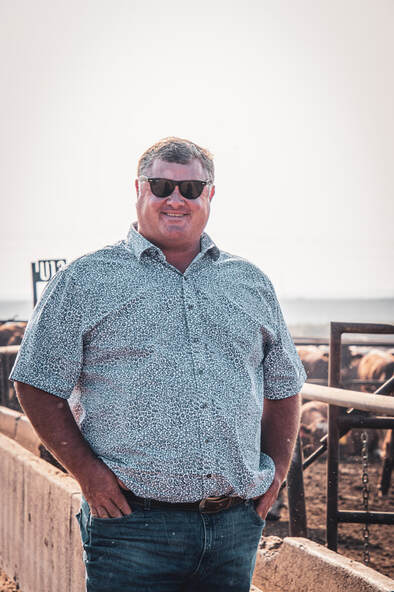
It’s no secret—Kevin Buse loves the cattle business and his passion for the industry derives from a sincere appreciation for those around him. “I’m a big believer in people,” Buse says. “I think the only reason I'm even successful at any level is because of the people by my side.” Buse lives in Amarillo with his wife, Renee. They have three children, Brock, Baron and Belle. He’s quick to recognize that the cattle business is a family business, one that too few have the opportunity to experience. “It's fun to watch them grow up on the farm and learn how to do things that 20 and 40 years ago, every kid knew how to do,” he says. “Today, that's not the case for most kids. It’s special.” His hope is, one day, they’ll appreciate who they are and what this livelihood taught them. PATH TO SUCCESS The CEO of Champion Feeders grew up in Sterling, Colo. However, he spent summers in Texas, where he learned the ins and outs of a feedyard at an early age. “I grew up at Lockney Feedyard,” he says. “From the time I was old enough to be legitimate help, around eight, I spent every summer there.” He credits his family, specifically Hank Winter, his grandfather and early TCFA member, for the opportunities that led him to a career in cattle feeding. Buse graduated from Sterling High School and attended Colorado State University, where he earned an animal science degree. “After that, I loaded up everything I had and moved to Amarillo to work for Friona Industries,” he says. He soaked in every opportunity possible from doctoring cattle at Randall County Feedyard to managing the mill at Friona Feedyard. In 2000, Buse became assistant manager at Swisher County Cattle Company. Three years later, Champion Feeders offered him a management position and piece of ownership. He’s been there ever since. Champion Feeders prides itself in building champion partnerships for the future. Its priority is producing the safest beef in the world with the best producers in the business. “There’s nothing more gratifying than building a business and watching it grow,” Buse says. “Building relationships and enabling your customers and their families to be successful is second to none.” For some, success may become boring over time. But that’s not the case in the feedyard, Buse explains. “If you’re doing things the right way and with the right people, you’d think after time it may become boring,” he says. “There’s no boring in this business and I enjoy that.” GET TO WORK MENTALITY When asked about his favorite part of the job, he quickly attributes it to the daily grind. “The nonstop is great. It's seven days a week, 24 hours a day,” he says. “The action that comes with buying, feeding, selling and owning cattle is what I love most.” Kevin recalls attending TCFA Summer Meeting with his family at a young age—a memory that guides his commitment to volunteer leadership. “Engaging with TCFA, to me, has always been extremely important,” he says. “It was always something that my family took a lot of pride in being a part of.” His engagement while serving as TCFA Chairman has not been lacking. Most notably, along with representatives from various cattle producing states, he served on NCBA’s price discovery and negotiated trade working groups. What may have been an unfavorable task for some, Buse eagerly took on the role with a get-to-work mentality—a mindset that paid off. In collaboration with their respective organizations, cattle producers within the group spent 18 months voluntarily working to increase price discovery and provide tools to increase market transparency. Ultimately, these industry-led efforts proved increasing negotiated trade volumes is possible without a government mandate. As a result, at NCBA’s Cattle Industry Convention in February, the association adopted policy to oppose government mandates or any interference with a feeder’s ability to market cattle—a win and step in the right direction for Buse and TCFA members. “Developing member-driven policy in a transparent manner where all perspectives can be heard is essential,” Buse says. “Through that process, TCFA members demonstrated our commitment to improving negotiated trade and price discovery, yet we remain diligent in our efforts to build upon this success.” A SEAT AT THE TABLE In 2010, Buse represented TCFA at NCBA’s Young Cattlemen’s Conference. He also served on the TCFA board of directors from 2010 to 2012 before rejoining the board and accepting an officer position as Vice Chairman in 2020. “There are not enough superlatives to properly commend Kevin’s work ethic and passion for our industry,” says Ben Weinheimer, TCFA president and CEO. “Kevin is a true advocate for cattle feeders as he continuously volunteers his time to find solutions to complex issues while ensuring everyone in the room has a voice.” If there is one thing Kevin Buse aims to communicate during his time as TCFA chairman, it’s that he wants everyone to have a seat at the table when it comes to the association. “I just would like for everybody to understand that it takes all of us to succeed and we need as many good minds at the table as we can possibly get,” he says. “If we lack the minds at the table, it hurts our business.” He adds that while all TCFA members may not always agree on everything, there are aspects of the association that can benefit everyone. Buse says the entire supply chain working together is critical moving forward. He says TCFA is one vehicle to facilitate collaboration and motivation throughout the industry. Yet, he believes it’s a matter of individuals from across the board coming to the table to improve the industry and ensure its success. “We have new competitors. We’re up against plant-based and cell-cultured products,” he says. “And that’s okay if that’s what the consumer wants, but as cattle producers, we all have to be at the table, working together, to advocate for the beef industry and ensure folks have the opportunity to stay in this business.” For anyone looking to start a career in cattle feeding, Buse says they should know they can’t be in it for the money, but because they love it and want to show up every day. “You have to do it because you take pride in producing something that you know is high quality and makes everybody better,” he says. “For someone coming into this business, you have to do it for the right reasons. If you do it strictly for the money, then you won't be in it very long.” Spend time with him, and you’ll find that he practices what he preaches. It’s not money or special status that got Buse to where he is today. Instead, it’s a pull yourself up by your bootstraps attitude, gritty work ethic, and relentless determination for success, not only for himself but for his family, customers and the cattle industry as a whole.
Throughout the month of April, 148 students representing 35 schools from the Texas Panhandle completed TCFA’s Spring 2022 Feedyard Technician Program.
The hands-on program is a collaboration between TCFA, West Texas A&M University and Texas A&M AgriLife Extension Services and provides high school juniors and seniors the knowledge and skills needed to prepare them for a potential career in the fed cattle industry. Because no two jobs are the same on a feedyard, the program covers different career paths. Spring participants learn and practice proper cattle care including safe handling techniques, the administration of vaccines and implants and Beef Quality Assurance requirements. Students also put their skills to the test in a mock-interview with industry leaders. Whereas fall participants discover the ins and outs of machinery operations along with facility maintenance and repairs. If you are interested in potentially hiring students who have participated in the program, please contact Brady Miller at [email protected] or Rachel Hernandez at [email protected], or call (806) 358-3681. |
Categories
All
Archives
June 2024
|
About TCFA |
Get Involved |
|








